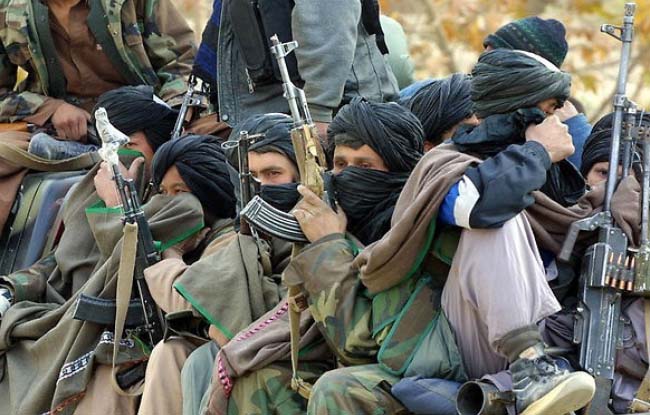As Afghan security officials were briefing MPs on Monday, March 28. Taliban sent a loud message by firing four rockets at the parliament’s new compound, signaling deterioration of security ahead of their spring offensive. The firing came as an outright justification for the MPs who were grilling the officials over deterioration of security situation across the country. The officials in the ministries of defense, interior and the National Directorate for Security reassured the house regarding the preparations of the security agencies for responding to the upcoming Taliban violence which is expected to start within coming weeks. The officials said the Taliban were bracing for start of their seasonal fight and aim to take territories and seize or disrupt key highways.
The firing at the parliament’s compound came as a symbolic attack by the Taliban at a time when the officials were explaining their anti-insurgency plans for this year and how the security agencies are going to cope with another peak of Taliban offensive. However, aside from the overall security developments and the deterioration of situation, the rocket firing demonstrated a major security gap for Kabul and the key government agencies’ compound in the capital. The Taliban have long been targeting major security and government installations which serve their propaganda and psychological wars. It is highly questionable that the government is still falling short of providing sufficient security to the parliament which has come under attacks of the militants in the past as well.
With the start of the spring season, the Taliban are bracing for launching another round of their seasonal offensive against the Afghan security forces. The officials of the security agencies told the MPs they are preparing for conducting a nation-wide security operation against the Taliban aimed at taking the war to the Taliban’s grounds and disrupting the insurgents’ war preparations. Despite the assurances, there are high uncertainties and concerns over the preparedness of the Afghan security forces in event of an extensive and large-scale Taliban offensive this year. The test, however, is for the Afghan government forces whether they will be able to effectively counter Taliban offensives and deter the militants during the year and prevent them from having permanent and momentary wins.
The Afghan security forces suffered some key weaknesses during the counterinsurgency efforts last year. The Taliban demonstrated high capabilities in shifting their war strategies aimed at making military gains and, in the meantime, stretching the government forces.
This was while the Afghan security forces lacked the resiliency and capability to adapt to the changing circumstances and match the shifting strategy of the Taliban. While the Taliban aimed to open many fronts in the north and south of the country to stretch forces and resources of the Afghan army and police forces, the government operated in a reactive way and struggled to repulse the Taliban offensive and roll back their wins. The security agencies were not prepared for fighting on several fronts, and therefore, responded in chaotic manner to many of the major Taliban offensives in the north and the southern provinces.
In many areas, where government forces experienced setbacks, there were visible lack of robust military leadership and lack of coordination between army units and their headquarters. However, lack of leadership at the highest levels and the lower ranks are criticized as the Achilles’ heel of the Afghan security forces.
There is a common belief that lack of leadership at the highest levels of the relevant security ministries resulted to poor leadership of the military in the fight against the insurgent groups across the country. Afghan security agencies are preparing for another year of anti-insurgency campaign while all the three key security ministries and directorates are led by caretaker officials. There has been growing calls in recent months for the government to resolve the stalemate of the leadership of the security organs and end the disarray in governance of the security and defense institutions.
However, there are no signs that the national unity government will be able to end the long-lasting limbo in which the leadership of the Afghan security agencies are.
The government needs to realize that the army and police forces would again demonstrate poor performances in absence of ministers who can better manage the security agencies in the fight against the insurgent groups. The situation would in no doubt further deteriorate if the government fails to appoint the relevant ministers and empower the security agencies in the campaign against the Taliban.
The stalemate of the peace efforts is another factor for another heightened season of war and violence this year. With failure of the peace overtures, both sides have started fresh efforts to make preparations for launching offensives and counteroffensives when the weather gets warmer.
The Taliban is believed to have refused to come to the peace negotiations to wait for a better time when they will have more gains on the battleground and more advantages on the table of negotiations. This year seems to be a year of decisive battle on the ground between the Afghan security forces and the Taliban who aim to gain more grounds. The Afghan officials say that regional intelligence are helping the Taliban to expand their operations and gain territories across Afghanistan.
The outcome of this year’s battles would have crucial impacts for the future peace efforts.
The peace initiative will remain stalled for an uncertain period of time and does not seem to restart until this year’s season of war determines who is going to have more gains on the battlefields. The government needs to mobilize the Afghan security forces and redouble efforts to better equip them for tackling the insurgency in 2016. The government should waste no time for boosting the leadership and improving morale of the forces by appointing the relevant security ministers.
Home » Opinion » Bracing for a Heightened Taliban Insurgency
Bracing for a Heightened Taliban Insurgency
| Abdul Ahad Bahrami

